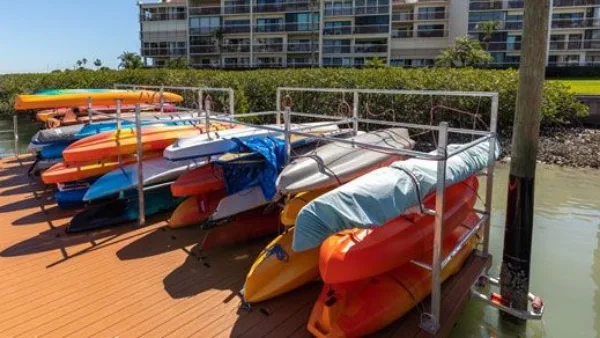Florida Condo Kayak Storage
Florida Condo Kayak Storage
The rules for kayak storage at a Florida condo can vary depending on the specific condominium association and its governing documents, such as the declaration, bylaws, and rules and regulations. Condo associations in Florida often have specific rules for storing recreational equipment like kayaks. Here are some rules and considerations that may apply:
- Review Condo Documents: Start by reviewing your condo's governing documents, including the declaration, bylaws, and rules and regulations. These documents should outline any specific rules related to kayak storage.
- Designated Storage Areas: Many condos have designated storage areas for recreational equipment like kayaks. These areas may be located in a storage room, garage, or outdoor storage racks. Check if your condo has such designated storage spaces, and if so, whether there are rules regarding their use. Sometimes the storage space may be full. Check before you enter into a contract if kayak storage is part of the criteria for your decision.
- Size and Type of Kayaks: There may be restrictions on the size and type of kayaks that can be stored within the condo property. Make sure your kayak meets any size or type requirements specified by the condo association.
- Registration and Identification: Some condos require residents to register their kayaks and label them with their unit number or owner identification. This helps ensure that only authorized residents are using the storage facilities.
- Use of Common Areas: Be aware of any rules about transporting your kayak through common areas of the condo, such as hallways or elevators. Some condos may have restrictions to prevent damage or disruption to common areas.
- Storage Fees: Check if there are any fees associated with kayak storage. Some condos may charge a fee for using storage facilities.
- Maintenance and Liability: Understand your responsibilities for maintaining and securing your kayak while it's in storage. You may be liable for any damage caused by your kayak or any injuries that result from improper storage or handling.
- Guest Access: If you plan to have guests or tennants use your kayak, make sure you understand the condo's policies regarding guest access to storage areas and the use of recreational equipment.
- Compliance: It's essential to comply with all the rules and regulations set by the condo association. Non-compliance can result in fines or other penalties.
- Communication: If you have any questions or concerns about kayak storage rules, contact your condo association's management or board of directors for clarification.
Remember that the specific rules and regulations for kayak storage can vary widely from one condo association to another, so it's crucial to consult your condo's governing documents and communicate with the association to ensure you're in compliance with their policies. Additionally, these rules may change over time, so it's a good idea to stay updated on any updates or amendments to the condo association's rules regarding kayak storage.

Prospective Florida condo buyers should, if they don't understand how kayak storage rules can impact their condo purchase, engage licensed and reputable attorneys and advisors to guide their buying decision.